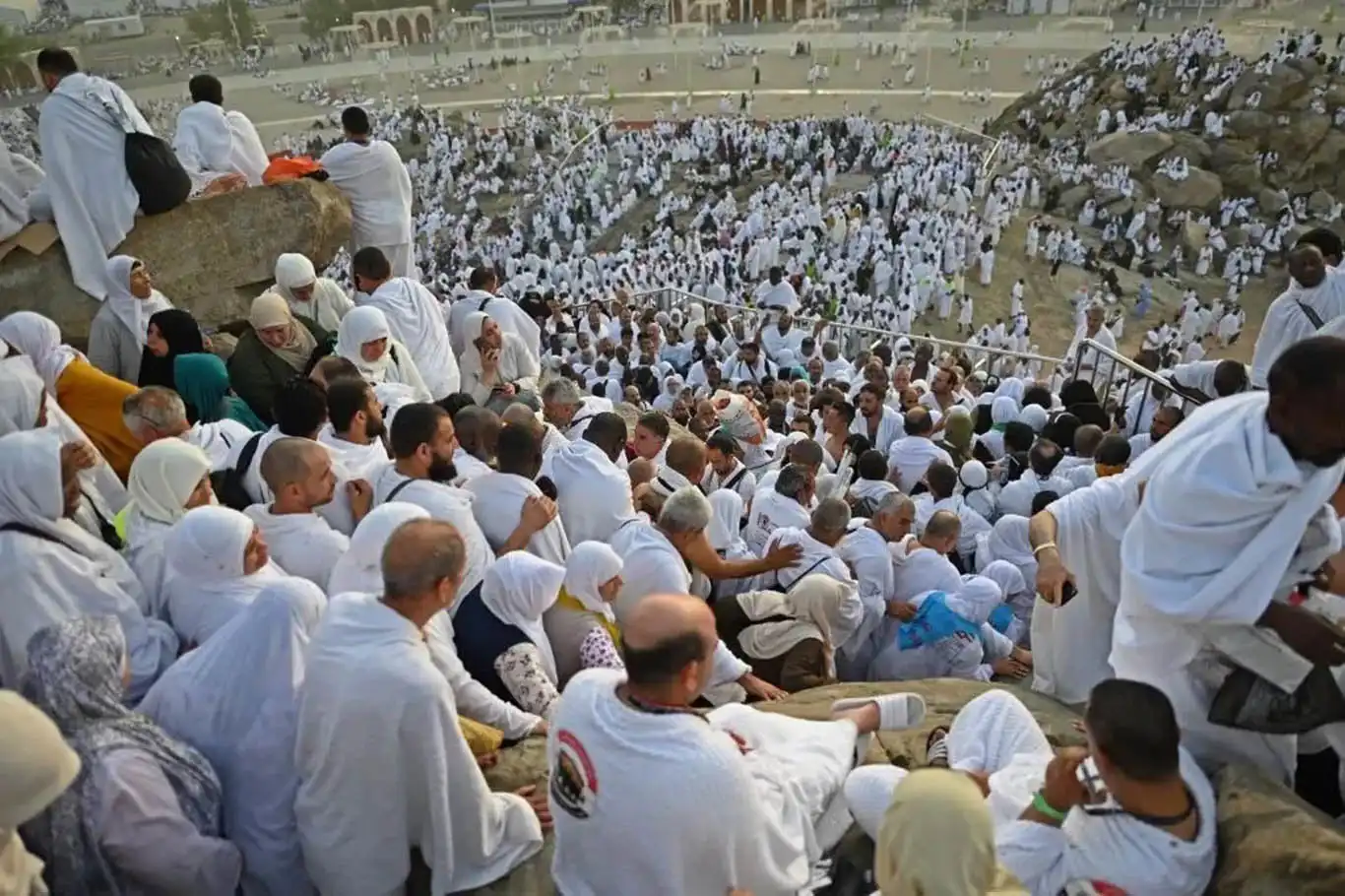Muslim pilgrims ascend Mount Arafat, marking the holiest day of Hajj


Tens of thousands of Muslim pilgrims gathered in reverence on Thursday atop Mount Arafat, east of Mecca, marking the pinnacle of the annual Hajj pilgrimage.
Against the backdrop of rising desert temperatures and tightened safety measures, worshippers observed the deeply spiritual rite known as the Day of Arafah, one of the most sacred moments in the Islamic faith.
Before the first light of dawn, pilgrims began arriving at the storied hill—Jabal al-Rahmah, or the Mount of Mercy—where Prophet Muhammad (Peace Be Upon Him) delivered his Farewell Sermon over 1,400 years ago during his final pilgrimage. The sermon encapsulated the core values of Islam: justice, equality, mercy, and unity, calling upon Muslims to uphold human dignity and avoid oppression. It was also at Arafat that the verse, “This day I have perfected for you your religion...” (Qur’an 5:3), was revealed, affirming the completion of Islam.
Clad in simple white garments known as ihram, symbolizing purity and equality before God, pilgrims raised their hands in intense supplication, recited verses from the Qur’an, and wept in prayer throughout the day, seeking Allah’s forgiveness and spiritual renewal. Many pilgrims stood silently under the scorching sun or sought shaded spots near the foot of the mountain, clutching umbrellas or fans to shield themselves from the heat.
Saudi authorities had earlier advised all pilgrims to remain inside air-conditioned tents between 10 a.m. and 4 p.m. to avoid sunstroke and exhaustion, as temperatures soared past 40°C (104°F). This guidance came as part of an aggressive heat mitigation campaign rolled out in the wake of last year’s Hajj, which tragically saw over 1,300 deaths—largely due to extreme heat, with temperatures then peaking at a deadly 51.8°C.
To prevent a recurrence of the 2024 disaster, Saudi Arabia mobilized over 250,000 personnel and expanded shaded zones by 50,000 square meters. More than 400 cooling stations, thousands of health workers, and smart surveillance tools including drones and AI-assisted crowd management systems are being deployed to protect the 1.8 million pilgrims expected this year.
After sunset, pilgrims will proceed to Muzdalifah, a desert plain midway between Arafat and Mina, where they will collect pebbles for the symbolic stoning of the devil ritual to be performed in the days ahead.
Officials have also intensified operations to block unregistered pilgrims from entering Mecca, citing concerns over their vulnerability due to lack of access to regulated accommodations and services. Drones, police raids, and mass text alerts have been used to enforce Hajj permit regulations, which are distributed globally based on quotas and lotteries.
Despite the enormous logistical challenges and searing conditions, the pilgrims’ determination remains undeterred. For many, the Day of Arafah is not only the central pillar of the Hajj but also a day of transformative spiritual significance. It is widely believed that a sincere supplication at Arafat can lead to the erasure of all past sins, and for Muslims around the world, whether present in Arafat or fasting elsewhere, it remains a profound occasion of prayer and reflection.
Saudi Arabia, which generates billions in annual revenue from Hajj and Umrah pilgrimages, continues to frame the pilgrimage as a symbol of Islamic unity and national pride. Yet the dual imperatives of spiritual sanctity and logistical safety remain a delicate balance for authorities and pilgrims alike.
As the sun set on Arafat, chants of “Labbayk Allahumma Labbayk” (“Here I am, O Allah, here I am”) echoed across the plain—an ancient response of devotion that has resounded from that sacred hill for over a millennium. (ILKHA)
LEGAL WARNING: All rights of the published news, photos and videos are reserved by İlke Haber Ajansı Basın Yayın San. Trade A.Ş. Under no circumstances can all or part of the news, photos and videos be used without a written contract or subscription.
In another blatant act of aggression against the Palestinian people and their land, illegal Israeli settlers on Friday night uprooted and cut down dozens of grapevine, olive, and almond trees in the town of Nahalin, west of Bethlehem.
United Nations Secretary-General António Guterres has issued a forceful condemnation of the Israeli government’s decision to seize control of Gaza City, warning that the move represents a blatant violation of international law and a dangerous escalation against the Palestinian people.
The Palestinian Ministry of Health in Gaza announced that hospitals in the besieged enclave had received the bodies of 72 martyrs and treated 314 wounded in the past 24 hours as Israel’s relentless aggression shows no sign of abating.
The Yemeni armed forces announced Friday evening that they had carried out three coordinated drone operations targeting Israeli sites in occupied Palestine.